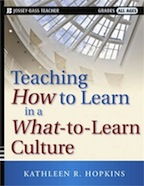
What does your child need to know?
Kathleen Ricards Hopkins explains that what children needs to know is not so much a sets of facts and procedures, as it is how to learn and think. She shows how to teach these skills, using examples from classroom conversations that can be adapted to the homeschool. Framed by her own learning experiences, each chapter takes concepts of educational psychology and shows how they can transform the educational experience. Every chapter includes short practical examples using teaching of fables, science, or biography.
How can learning these concepts in educational psychology help you help your children learn? Here’s one example.
What does it mean to be smart? Chapters 1 and 2 examine different ways to define intelligence, and how that affects how we teach and what we think of ourselves and of our students. Following Rafi Feuerstein’s approach, Hopkins explains three different views of intelligence:
Why does what you believe about intelligence matter? If you believe intelligence is not fixed from birth but changeable, it will affect how you teach a struggling learner. You will be less tempted to set the bar too low. You will focus more on helping your child learn to think. You will help his or her self-esteem.
The idea that intelligence can be modified is one key concept of the book. A second is the notion of mediated learning. In this approach, educators don’t just tell children information. We ask and wait for them to recall and reason, and help them clarify their thoughts and interpret facts, so students can “focus, frame, and consider relationships.” (P. 11.) The idea is to build oral language skills, which strengthens the children’s ability to think. This strengthens their “inner language,” their ability to think in clear sentences in their heads, which leads to better cognition and better writing.
Want to stay in the zone as your teach? A third useful concept taught and illustrated in this book is the “zone of proximal development.” This is the “distance between what a child can do alone and what he or she can do during problem solving under adult guidance.” p. 85. Defined by Lev Vygotsky in his classic book, Thought and Language, this “collaborative, open-forum problem solving” approach helps develop higher level thinking skills.
While some of Kathy Hopkins’ book is geared toward the classroom, the core concepts can improve homeschooling. One of her goals is to encourage teachers that they can become better teachers—and what homeschooler does not want that?
Most books I have seen for teachers are dull, obtuse, and often concerned with managing classrooms. As a former English teacher, my biggest complaint is that books for teachers often are not written in good clear English, but what I call Educationalese, a dialect of pseudo-scientific jargon in the passive voice. But Kathy Hopkins takes these important concepts and makes them readable.
Consider how the world and the job market in particular have changed since you were in school. By teaching our children how to learn, we equip them to keep pace, we encourage them to exercise their minds, we help them to be thinking, useful citizens.
If this review has piqued your curiosity, I recommend this book. Its author is an experienced teacher, educational expert, and the executive director of the National Institute for Learning Development. NILD provides training in their educational therapy program designed to remediate and accommodate learning disabilities.
If you click on the link below, a portion of your purchase will help support this website. Thank you.